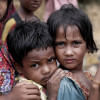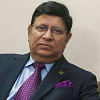Rohingya Violence: US mulls sanctions on Myanmar

The US is considering a range of steps including "targeted sanctions" against the Myanmar government over its "violent, traumatic abuses" of Rohingyas which triggered a massive exodus in the restive Rakhine State.
US State Department Spokesperson Heather Nauert has said the US halted consideration of travel waivers for current and former Myanmar military leaders and is assessing further economic options available to target individuals associated with atrocities.
"We express our gravest concern with recent events in Rakhine State and the violent, traumatic abuses Rohingya and other communities have endured.
"It is imperative that any individuals or entities responsible for atrocities, including non-state actors and vigilantes, be held accountable," she noted in a press statement on Monday.
More than 600,000 displaced Rohingyas have fled their homes in Rakhine and taken refuge in Bangladesh since the crisis began on August 25.
On October 16, the European Union suspended invitations to the commander-in-chief of the Myanmar armed forces and its other senior military officers in the light of the disproportionate use of force.
The EU also said it would review all practical defence cooperation, and may consider more steps if the situation in Rakhine doesn't improve.
According to an AP report, US officials are preparing a recommendation for Secretary of State Rex Tillerson to declare that "ethnic cleansing" is occurring against Rohingyas in Myanmar. That assessment would raise pressure on the Trump administration and US lawmakers to consider new sanctions on a country that had been lauded for its democratic transition.
The US government began a programme of sanctions against Myanmar in May 1997 when the country was run by a military junta. Following a transition toward democracy, President Barack Obama ended the programme last year. The EU lifted sanctions against Myanmar in 2013, with the exception of an arms embargo.
Heather Nauert said, "We find all units and officers involved in operations in northern Rakhine State to be ineligible to receive or participate in any US assistance programs."
The US has also rescinded all invitations to senior members of Myanmar's security forces to US-sponsored events.
She mentioned that the US was consulting with its allies and partners about accountability options at the UN, the UN Human Rights Council, and other appropriate venues, and was also exploring "accountability mechanisms available under US law".
"We are working with international partners to urge that Burma enables unhindered access to relevant areas for the United Nations Fact-Finding Mission, international humanitarian organisations, and the media."
The US will continue to support Myanmar's transition to democracy, as well as efforts to resolve the current crisis in Rakhine State, she said in the statement, a sign that the US may reimpose sanctions on Myanmar.
"However, the Myanmar government, including its armed forces, must take immediate action to ensure peace and security; implement commitments to ensure humanitarian access to communities in desperate need; facilitate the safe and voluntary return of those who have fled or been displaced in Rakhine State," Nauert said.
The US spokesperson called for addressing the root causes of systematic discrimination against the Rohingyas by implementing the recommendations of Kofi Annan Commission.
RECOMMENDATION FOR US SECRETARY OF STATE
Rex Tillerson could receive as early as this week the recommendation for declaring that "ethnic cleansing" is occurring against Rohingyas, officials familiar with the process told AP.
He will then decide whether to adopt the advice of his agency's policy experts and lawyers.
A declaration of "ethnic cleansing" by the top US diplomat would mark a reversal of fortune in American relations with Myanmar whose civilian government has been under the leadership of Nobel Peace laureate Aung San Suu Kyi for more than a year.
But Suu Kyi and her government allies have little control over Myanmar's still powerful military, which is blamed for the brutal crackdown on Rohingyas.
The recommendation is being prepared as US lawmakers urge fresh sanctions on Myanmar's military and are calling on the Trump administration to sever already restricted military ties.
Calls for a US determination of "ethnic cleansing" have intensified, as the UN and leading Western governments have used the term. Six weeks ago, UN human rights chief Zeid Ra'ad al-Hussein said it "seems a textbook example of ethnic cleansing."
Tillerson, who last week said perpetrators would be held accountable for atrocities, has referred to the violence as "characterised by many as ethnic cleansing."
Nikki Haley, US ambassador to the UN, told the Security Council last month that it was "a brutal, sustained campaign to cleanse the country of an ethnic minority."
US lawmakers have pushed the administration to use the term without qualification.
Earlier this month, Patrick Murphy, a senior US diplomat for Southeast Asia, described it as a "human tragedy".
More than 40 House members wrote to Tillerson last week to seek "significant actions to stop the ethnic cleansing" of the Rohingyas.
Twenty-one senators wrote to Haley, urging multilateral sanctions against specific senior Myanmar military officials.
HEARING AT SENATE COMMITTEE
The Senate Foreign Relations Committee yesterday held a hearing on US policy toward Myanmar.
At the hearing, senior senators demanded a rethink of US policy toward Myanmar in response to what they called a systematic military campaign to force Rohingyas out of the country.
Ben Cardin, the top-ranking Democrat on the Senate Foreign Relations Committee, characterised the crackdown as "genocide" and said the US should seek accountability for the perpetrators.
Bob Corker, the Republican committee chair, questioned whether the Obama administration had rolled back sanctions too quickly in response to Myanmar's shift toward democracy.
DHAKA SEEKS GLOBAL ACTION
Bangladesh has renewed its call to the UN for playing a stronger role in ensuring the safe return of all Rohingyas to their homeland from Bangladesh.
There's no alternative to the return of around 1 million forcibly displaced people from Myanmar to their homeland with dignity and safety. The international community and the UN need to play a stronger role in finding a solution to the problem, Dipu Moni, chairperson of the Parliamentary Standing Committee on Foreign Affairs, said at the UN headquarters in New York on Monday.
Dipu Moni, also former foreign minister, pointed out that the international community can no more dishearten these Rohingya people, according to a press release of the Permanent Mission of Bangladesh to the UN.
She held meetings with UN Under-Secretary-General for Political Affairs Jeffrey David Feltman, Special Representative on Sexual Violence in Conflict Pramila Patten and Special Rapporteur on the situation of human rights in Myanmar Yanghee Lee.
AID FROM UK, SWITZERLAND
The UK and Switzerland have pledged an additional $24 million as humanitarian assistance for the Rohingya refugees in Bangladesh.
At the pledging conference in Geneva on Monday, the UK announced that it would provide further £12 million ($15.78 million) for them.
With this, the UK has committed £47 million ($63 million) since the end of August, said a press release of the British High Commission.
Switzerland has decided to increase its financial contribution to $8.8 million. Earlier, it had provided $1 million as emergency assistance for the refugees.

 For all latest news, follow The Daily Star's Google News channel.
For all latest news, follow The Daily Star's Google News channel. 








Comments